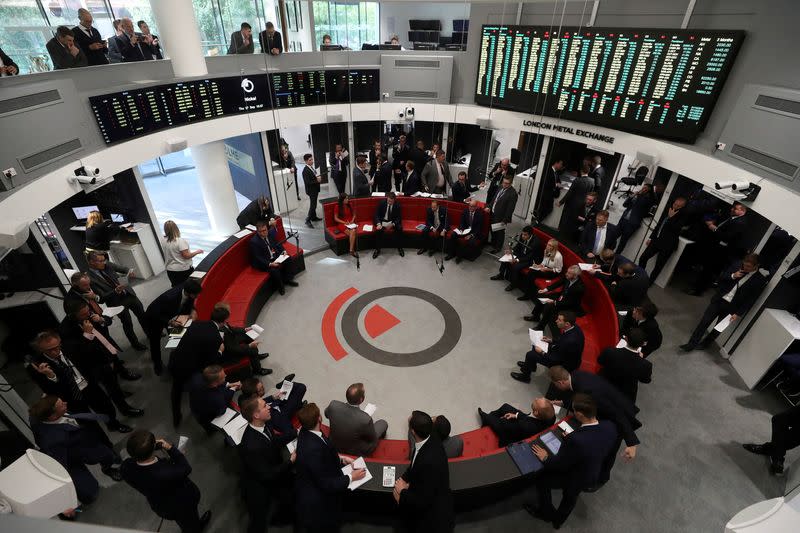LME CEO urged nickel trading halt minutes after waking up -court document

By Kirstin Ridley and Eric Onstad
LONDON (Reuters) -The head of the London Metal Exchange spent just 20 minutes on his mobile phone scrolling for news and watching nickel prices lurch higher last year before deciding the market was disorderly and later halting trading, according to a High Court document.
The updated filing was lodged by Jane Street Global Trading, a market maker that is suing the LME for $15.34 million after it cancelled around $12 billion of nickel trades. The document outlined fresh details of unprecedented events on March 8, 2022, from information it received from the LME for its case.
Jane Street alleges the world's largest metals marketplace failed to properly investigate chaotic nickel prices, whether the market was behaving rationally and what harm the decision to cancel trades would cause some market participants.
The LME, which last year enraged some investors after suspending trading for the first time since 1988, has argued it had both the power and duty to close the market because $19.7 billion of margin calls would have led to the bankruptcy of multiple clearing members and created systemic market risk.
Jane Street's document, filed on March 3 and seen by Reuters on Friday, gives the most detailed account yet of decision-making at the 146-year-old LME one year ago.
Before LME Chief Executive Matthew Chamberlain awoke at 5:30 a.m., an LME operations team removed nickel price bands during Asian trading, allowing prices to surge to a record above $100,000 a tonne, the document said.
"Based on these 20 minutes of checking his phone just after he had woken up, Mr Chamberlain concluded at or by 05:50 that there was an 'absence of rational market forces capable of explaining these developments' and that the market was disorderly," the document said.
"By 06:08 he had suggested ... that trading should be suspended."
Jane Street has launched a judicial review against the world's largest and oldest metals market along with U.S. hedge fund Elliott Associates, which is suing for $456.4 million.
Jane Street said its account of events was based on information disclosed by the LME, including four witness statements and 3,850 pages of documentary evidence.
Later, between 7:30 a.m. and 07:55 a.m. on March 8, an LME meeting was held online, which formally took the decision to suspend trading, according to the court document.
A spokesperson for the LME said the exchange would set out its response to Jane Street's document in its own court filings in due course and that it would be "inappropriate to comment further at this stage".
Jane Street could not immediately be reached after business hours on Friday.
LME SPECIAL COMMITTEE
A day earlier, on March 7, when LME benchmark nickel prices had soared 66% to nearly $50,000 a tonne, the LME's Special Committee had met, Jane Street's document said.
The Committee, which has emergency powers, "concluded that the nickel market remained orderly, since there were geopolitical and macroeconomic reasons for the price increases".
The next day, however, when nickel prices skyrocketed, the committee did not meet, the document said.
When the nickel market opened on March 8 at 1 a.m. London time, before most LME officials were awake, an operations team allowed prices to climb during Asian trading, the document said.
"The price increases in early trading ... were actively facilitated by the LME's trading operations team amending and then manually suspending all price bands," the document said.
The LME, when Jane Street queried that, stated that the trading operations team “was not concerned with whether the market was functioning in an orderly manner”, according to the document.
Jane Street argues in court filings that the LME was wrong to consider the views of some parties who would benefit from cancelled trades and not others who would lose money.
Large short positions held by China's Tsingshan Holding Group helped spur the explosive rise in nickel prices, triggering billions of dollars of margin calls that threatened to push some banks and brokers into default.
From around 6 a.m. on March 8, Chamberlain "received numerous representations" from clearing members urging him to suspend the market and, in some cases, cancel contracts, the document said.
No equivalent opportunity to have such discussions was given to other market participants whose economic interests would be damaged, the filing alleged.
"That omission was manifestly unfair," it stated.
Chamberlain also received a proposal from Gavin Prentice, chair of the LME User Committee, that the LME shut the market for 24-48 hours to allow margin calls to be made and reopen with a 10% price cap, the document said.
The LME appeared to have failed to give proper consideration to Prentice’s recommendation, Jane Street said.
Jane Street executed nickel trades from 1:37 a.m. on March 8 and was due total proceeds on those trades of $32.7 million, it said in the document.
The LME is also facing fresh lawsuits from ten hedge funds and asset managers for cancelling nickel trades.
Last week, a British financial watchdog launched its first ever investigation of a UK exchange for possible misconduct over the decision to halt trading.
(Editing by Kirsten Donovan)

 Yahoo Finance
Yahoo Finance 